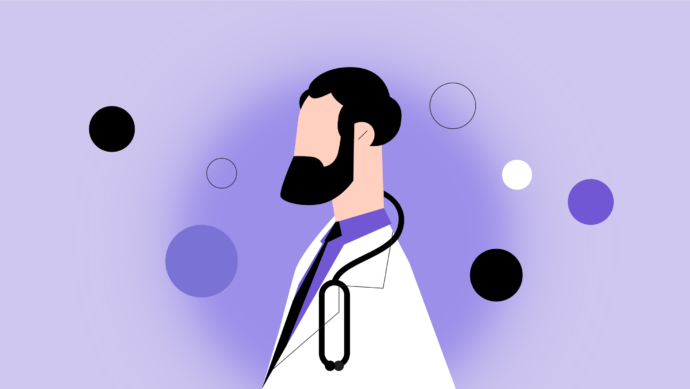
What defines the qualities of a good doctor largely depends on who you’re speaking to. Each patient population, region and cultural context may demand unique characteristics, from empathy to communication.
But no matter where you are, there are certain traits that, across the board, correspond with personal and professional success among doctors.
Here’s a guide to nine of the most important qualities of a doctor, with unique perspectives from doctors along the way.
The 9 most important qualities of a good doctor
The following traits contribute to a doctor’s competence. Literature closely associates them with various positive personal and clinical outcomes—including increased career satisfaction, improved patient outcomes and enhanced organisational stability.
1. Communication skills
Approximately half (45%) of Sermo doctors cite communication as the most important part of the doctor-patient relationship. Researchers also associate strong communication with improved organisational health and high-quality patient care.
Another Sermo member offers this advice: “Do not give false hopes and always ask if there is any doubt. Simple and clear language should be used, adapted to the person to whom the information is being transmitted.”
2. Conscientiousness
Conscientiousness is a necessary trait for doctors, both through education and in practice. Researchers identified conscientiousness as one fundamental trait of great doctors, along with competence and a caring disposition. Researchers also associate a doctor’s conscientiousness with improved patient satisfaction.
Doctors should be wary, though. Highly conscientious individuals may be at greater risk of burnout, and doctors rank markedly higher in conscientiousness than non-doctors. On top of that, a survey of more than 900 Sermo doctors worldwide found that 88% sacrifice personal time and experiences for their profession.
While a certain degree of sacrifice is necessary, doctors should prioritise their own well-being. As one GP and Sermo member puts it, “If health personnel are not in good mental health, patients cannot be cared for as they need.”
3. Empathy
Empathy drives many doctors and is central to what makes a good doctor. According to a Sermo survey on career motivation, 46% of doctors say the main reason they chose medicine was to help others.
The medical community widely accepts this sentiment. Nearly 60% of Sermo’s doctors cite empathy as the most important component of effective patient communication. Additionally, researchers strongly associate a doctor’s empathy with improved patient satisfaction and clinical outcomes.
Another of Sermo’s doctors offers this advice: “Treat all patients equally, regardless of their origin, social class, religion, beliefs, lifestyle… The doctor has to treat patients, not judge them. The information must always be sincere and truthful.”
4. System citizenship
A doctor’s success is less contingent on being a compendium and more on applying systems thinking to address interconnected patient, population and health system needs. We can think of this as system citizenship.
System citizenship recognises each doctor as an integral part of a shared ecosystem. It calls for collective responsibility, interdependent collaboration and continuous improvement. Doctors who are system citizens improve patient care and position themselves to address evolving healthcare challenges.
Researchers from Virginia Tech, Penn State, Kaiser Permanente, Allegheny Health Network and Geisinger surveyed residents across 10 training institutions. They asked participants to nominate faculty members who they recognise for their system citizenship. From 289 nominations, respondents identified 11 faculty members.
In conversations with these 11 members, researchers identified eight common sub-traits. They:
- Identify personal and professional mentors who are central to their development
- Exhibit generosity, selflessness, humility, adaptability and resolve
- Express values that guide their behaviours and positively influence colleagues
- Demonstrate effective interpersonal and communication skills
- Intentionally cultivate expertise in team collaboration
- Remain calm under high-pressure situations
- Employ creative systems-thinking strategies to solve problems
- Integrate systems-based practice teaching into clinical care
5. Ethics
Following primum non nocere is one of the profession’s core ethical components. As one Sermo member posted when speaking about what makes a good doctor: “To cure sometimes, to relieve often, to comfort always.”
Primum non nocere is a reflection of non-maleficence and a part of the profession’s broader ethical framework, which includes patient autonomy, beneficence and justice. Doctors who adhere to this ethical framework better position themselves to make sound clinical decisions and improve patient care.
6. Unflappability
Doctors must build their tolerance to uncertainty, particularly in specialities with high acuity. A doctor’s unflappability influences their personal and professional outcomes.
Researchers developed an uncertainty tolerance (UT) scale for A&E doctors and examined its links to performance and outcomes. Higher UT scores correlate with improved doctor psychological well-being—specifically, greater resilience and reduced burnout.
Other researchers found a notable link between doctors’ comfort with uncertainty and patient-reported outcomes. In a survey of 217 doctors, those who tolerated uncertainty well were significantly more likely to receive positive patient satisfaction scores. A doctor’s unflappability also closely corresponds with reduced surgical errors.
7. Intellectual curiosity
A good doctor stays informed of advancements in medical science, constantly improving their skills to provide the best possible care. As one O&G doctor and Sermo member says, medicine is “a great profession if you like being a lifelong student.”
It’s specifically important for doctors to exercise epistemic humility. This form of humility is one of the central characteristics of a good doctor. As one Sermo member explains, “The first virtue of a good doctor should be honesty and trustworthiness, knowing where their limitations lie and putting maximum interest in solving his patients’ problems—even if to do so we have to rely on the experience and knowledge of other colleagues and recognize it with humility.”
Beyond improving collegial relationships, epistemic humility decreases the risk of malpractice and improves doctor-patient relationships.
8. Advocacy
Doctors hold a unique position in patient advocacy. As one Sermo community orthopaedic surgeon notes, “Our frontline experiences provide unique insights into both the successes and shortcomings of current healthcare systems”.
A doctor’s familiarity with patients’ clinical complexities, social determinants of health and the healthcare system at large enables them to champion policy reforms and address systemic barriers. A paediatrician elaborated on Sermo, saying, “It is essential that health policy and economic decisions are made by actively practising doctors who regularly see patients.”
9. Collaboration
Effective collaboration among doctors improves clinical outcomes and reduces error rates. It also decreases onerous workloads for doctors and increases their career satisfaction more generally.
Today, collaboration also includes online media. Sermo’s global survey of doctors identified that over 20% desire an online community. It’s here that doctors across the globe can discuss the topics that are important to them and their patients.

How can doctors develop these skills?
Doctors should consider their own areas of competence and areas for growth. Mentoring, self-assessments and peer reviews can help:
- Mentorship: doctors who actively engage in formal mentoring demonstrate measurable improvements, both personally and professionally.
- Self-assessment: While self-reflection methods alone may have limited efficacy, they can still complement other forms of review.
- Peer review: Researchers strongly associate 360-degree feedback with improved career performance. Combining 360-degree feedback with mentoring enhances its effectiveness.
Additionally, participating in a peer community—one where doctors frame concerns and routinely share ideas—fosters improved learning and enhances the quality of professional judgment. And beyond improving clinical competence, doctors with a peer support network experience meaningful improvements in well-being.
Learn what other doctors consider core competencies
Knowing how to describe an excellent doctor starts with empathy and clear communication, but there’s so much more than this. Offering advice to be a good doctor, one Sermo member, an O&G from France, says, “Be less technical and more human.”
Another Sermo member and U.S. emergency medicine doctor says, “Remember that you are treating human beings, someone’s mother/father, daughter/son, sister/brother. How would you treat you? Don’t take shortcuts. Don’t let non-doctors make clinical decisions. Stand up for your patients and your profession. Don’t feel forced to be politically correct. Call out stupidity when you see it.”
Join the conversation. Become a part of the world’s largest online network of doctors.
